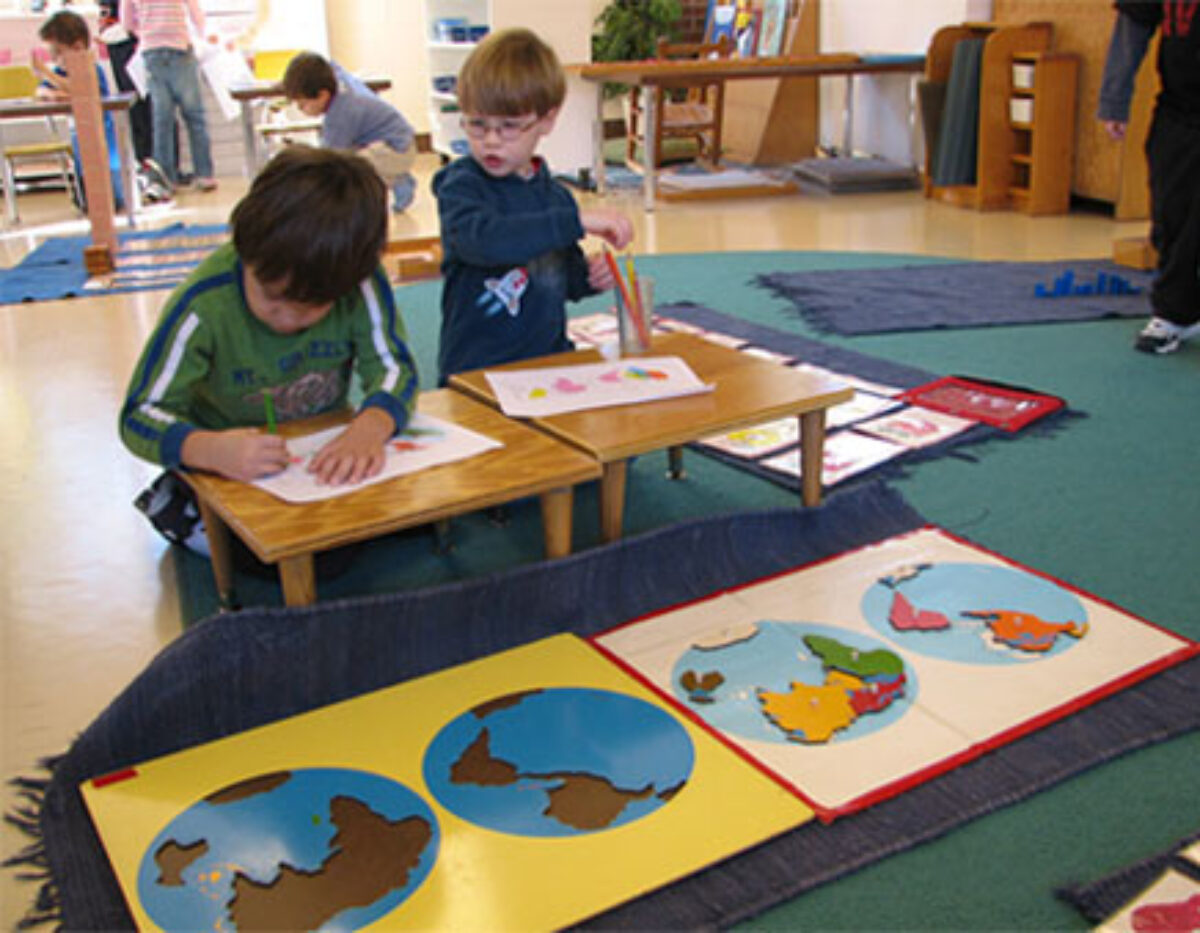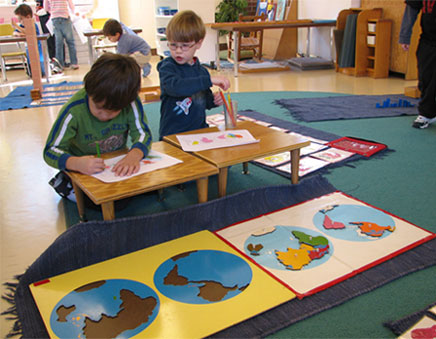EARLY CHILDHOOD: SUMMARY
The Montessori Early Childhood Curriculum covers the rationale underlying Montessori materials, method, philosophy, the design and dynamics of the prepared environment, the catalytic role of the Montessori teacher, the unique interplay of freedom and discipline, psychology of the child, factors influencing a child’s self image, effective teacher-child relations. Laboratory sessions with presentations and hands-on experience with the materials help foster the development of Montessori skills and insight.
Prerequisites:
- A Bachelor’s Degree from a regionally accredited U.S. college/university or its equivalent (in any area of study) for a Full AMS Early Childhood credential
- A High School Diploma plus one year of college credits (in any area of study) to be eligible to receive an Associate Early Childhood credential
Tuition and Fees:
$100 Non-Refundable Application Fee
$7,700 - See Academic Catalog for details
Fees for Program Options:
- $300 For Adult Leaerners who select a two-year Self-Directed Practicum (rather than the regular one-year Supervised practicum)
EARLY CHILDHOOD: SYLLABUS
REQUIRED READING
"The Montessori Method", "The Absorbent Mind", Dr. Montessori’s Own Handbook", The Discovery of the Child", "The Secret of Childhood", "Advanced Montessori Method Vol I". All are by Maria Montessori and available at your local bookstore or Nienhuis Montessori, 1-800-942-8697.
PRACTICAL LIFE
This area includes activities which assist the child in developing practical living skills. Exercises include: the care of person and environment, social behavior and exercises to develop balance and coordination. The goal of Montessori’s Practical Life is to develop the child’s order, concentration, coordination and independence.
SENSORIAL
Dr. Montessori stated that "Our sensory material, in fact, analyzes and represents the attributes of things: dimensions, forms, colors, smoothness or roughness of surface, weight, temperature, flavor, noise, sounds. It is the qualities of the objects, not the objects themselves which are important" The Pink Cubes, Brown Prisms and Red Rods are examples of some of the materials that will be presented during this area of study.
CULTURAL SUBJECTS
The areas of Geography, History and Science are components of the Montessori curriculum. They encompass ideas of Cosmic Education and the inter-relatedness of all things. This is the area where peace education is introduced. Montessori believed it was the desire of every human being in their intelligence and endless curiosity to know and explore the world around them.
MATHEMATICS
Working with 1-10 quantity/numeral relationships; the concrete conceptual composition of teens, tens etc, the concrete representation of the decimal system, fractions and the operations of addition, subtraction, multiplication and division are all part of the math curriculum in a Montessori environment. Montessori speaks of the "mathematical mind" of the child- that part of the mind "which is built up with exactitude" and reflects a natural tendency in the young child toward precision, classification and measurement.
LANGUAGE
Language is present at all times in the Montessori classroom, but is formally introduced through a phonetic approach. The children are introduced to the sounds of the alphabet using sandpaper letters which expose the child not only to the visual representation of the letter, but also to its sound.The process of combining the sounds into words is introduced through the use of the moveable alphabet. This is the Montessori approach to the beginning of formal reading.
CHILD DEVELOPMENT
Montessori’s philosophy is based on observing a child in a prepared environment. This course covers Montessori’s psychology of child development and relates it to other psychologists amid current research.
MONTESSORI PHILOSOPHY
Dr. Montessori’s ideas of education were based on her observations of how children learn. She believed that education was an aid to life and she was the first educational philosopher to develop a curriculum which supported her philosophy. Montessori philosophy introduces the student to these ideas and how they are applied and related.


EARLY CHILDHOOD: SCHEDULE
PHASE I (Summer 2025)
Lecture-demonstrations of the Montessori Early Childhood curriculum and philosophy.
- Schedule: Monday, June 16 - Friday, July 25, 2025
- Hours: Monday - Friday 8:00 AM – 4:30 PM with 1/2 hour for lunch
- Juneteenth Holiday: No class on Friday, June 20, 2025
- Independence Day Holiday: No class on Thursday, July 3, 2025 & Friday, July 4, 2025
- Location: Deerfield Montessori School, 760 North Avenue, Deerfield, IL 60015
PHASE II (School Year 2025-26)
Practicum, Institute, and Classroom Consultations. August 2025 - June 2026
- Supervised (Regular) Practicum – 3 hours/day, 5 days/week for an entire school year. Those 3 hours/day must be during the morning work session supervised by a qualified Montessori Director/Directress.
- Self-Directed Practicum – Self directed means you will be a lead teacher in a classroom which requires a 2 year practicum. NOTE: This option is only considered if a sponsoring school requests it - Contact MMTTC before choosing this option.
- Institutes – Three, 3–day institutes (Thursdays, Fridays and Saturdays, 8:00 AM – 4:30 PM), one in fall 2025, one in winter 2026, and one in spring 2026.
Note: MMTTC will appoint a consultant to visit the adult learner at their practicum site as indicated on the Practicum Site Agreement and in the Adult Learner Handbook. Written requirements include:
- Five Montessori Albums
- One essay on Montessori Philosophy
- Reading assignments from Montessori books
- Four school visitation reports
- A year – long child development project
- Montessori theory and curriculum examination
PHASE III (Summer 2026)
Second Summer Assessments
- Schedule: Monday, June 8 – Friday, June 12, 2026
- Hours: Daily 8:00 AM – 4:30 PM
- Location: Deerfield Montessori School, 760 North Avenue, Deerfield, IL 60015
EARLY CHILDHOOD: FACULTY
LOUISE KUNERT
Louise received her AMS Early Childhood and Elementary I certification at MMTTC. She has been Director of two Montessori schools and, along with her husband, Michael, has directed MMTTC since 1989. Louise is the Director of Education for MMTTC and she teaches Montessori philosophy.
PAMELA ZIRKO M.ED
Pamela is an experienced AMS certified Early Childhood, Elementary I and Elementary II teacher and administrator. Pamela received her Early Childhood and Elementary I and II certification at MMTTC. She is currently a Montessori consultant and lecturer and is the Early Childhood Child Development and Cultural Subjects instructor for MMTTC.
MARGARET COMBS MA and MFA
Margaret is an experienced AMS Montessori certified Early Childhood teacher and administrator. Margaret received her Early Childhood certification at MMTTC. She is currently a Montessori consultant and lecturer and is the Early Childhood Mathematics instructor for MMTTC.
KATHLEEN KASSER
Kathleen is an experienced AMS Montessori certified Early Childhood teacher and administrator. Kathleen received her Early Childhood certification at MMTTC. She is currently a Montessori consultant and lecturer and is the Early Childhood Language instructor for MMTTC.
MARIA REBELOS
ANDREANA REBELOS
Ready to Enroll?
© 2024 MMTTC - All Rights Reserved.
